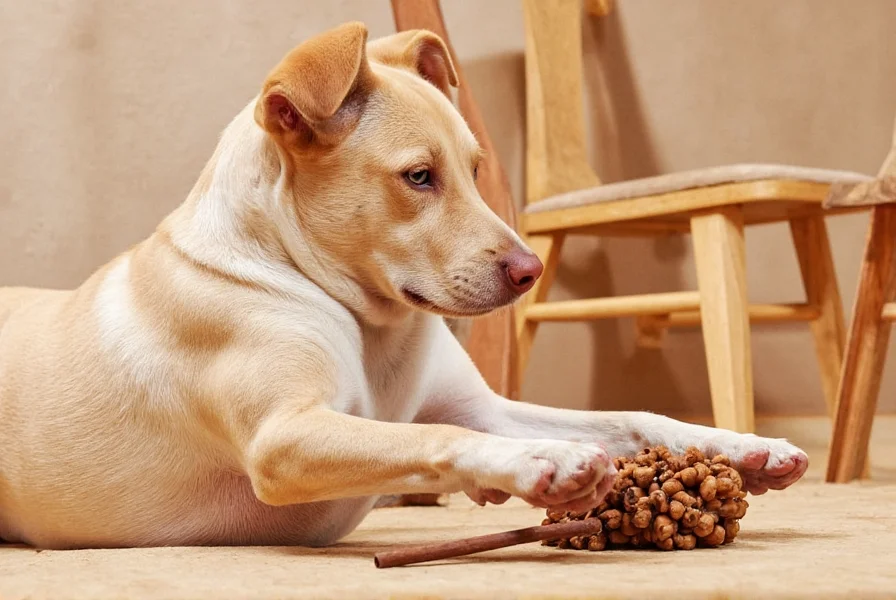Yes, cinnamon can potentially hurt dogs, especially in large quantities or when consumed as essential oil. While small amounts of cinnamon powder are generally not toxic, they can cause digestive upset, low blood sugar, and liver disease in dogs. Cinnamon essential oil is particularly dangerous and should never be given to dogs.
As a pet owner, discovering your dog has eaten something unexpected can trigger immediate concern. When it comes to cinnamon, the good news is that this common kitchen spice isn't highly toxic to dogs in small amounts. However, understanding the potential risks and appropriate responses is crucial for responsible pet care.
Understanding Cinnamon's Effects on Dogs
Cinnamon contains a compound called coumarin, which in large quantities can cause liver damage in both humans and animals. While dogs aren't as sensitive to coumarin as some other species, they can still experience negative effects when exposed to significant amounts.
The form of cinnamon matters significantly. Cinnamon powder, sticks, and essential oil each present different risk levels for dogs. Most accidental exposures involve small amounts of cinnamon powder from spilled food or baking ingredients, which typically causes minimal issues.

Different Forms of Cinnamon and Their Risks
Not all cinnamon products pose the same level of risk to dogs. Understanding these differences helps determine appropriate responses:
| Cinnamon Form | Risk Level | Potential Effects | Concerning Amount |
|---|---|---|---|
| Cinnamon powder | Moderate | Mouth irritation, digestive upset, low blood sugar | More than 1 teaspoon per 15 pounds of body weight |
| Cinnamon sticks | Low | Choking hazard, mild digestive upset | Chewing on multiple sticks |
| Cinnamon essential oil | High | Liver damage, severe digestive issues, respiratory distress | Any amount |
| Cinnamon-scented products | Variable | Skin irritation, respiratory issues | Contact with skin or inhalation |
Symptoms of Cinnamon Overexposure in Dogs
If your dog has consumed a concerning amount of cinnamon, watch for these symptoms:
- Vomiting and diarrhea
- Drooling or pawing at the mouth
- Low blood sugar (lethargy, weakness, collapse)
- Changes in heart rate
- Difficulty breathing (especially with inhaled powder)
- Liver damage symptoms (jaundice, increased thirst, loss of appetite)
The severity of symptoms depends on the amount consumed, the dog's size, and the form of cinnamon ingested. Small dogs are at greater risk from the same amount compared to larger breeds.
What to Do If Your Dog Eats Cinnamon
Remain calm and follow these steps if your dog consumes cinnamon:
- Assess the situation: Determine what form of cinnamon was consumed and approximately how much
- Check for immediate symptoms: Look for signs of distress, mouth irritation, or difficulty breathing
- Contact your veterinarian: Provide details about what your dog consumed
- Do not induce vomiting unless specifically instructed by a veterinary professional
- Monitor your dog for the next 24-48 hours for developing symptoms
For cinnamon essential oil exposure, seek immediate veterinary attention regardless of the amount. Essential oils are highly concentrated and pose significant risks to dogs.
Can Dogs Benefit from Cinnamon?
Some pet owners wonder if dogs can benefit from cinnamon's potential health properties. While cinnamon has antioxidant and anti-inflammatory properties in humans, there's limited scientific evidence supporting health benefits for dogs.
Some holistic veterinarians suggest small amounts of cinnamon might help regulate blood sugar in diabetic dogs, but this should only be done under veterinary supervision. Never add cinnamon to your dog's food without consulting your veterinarian first.
Preventing Cinnamon Exposure
Prevention is always better than treatment when it comes to potential toxins. Here are practical steps to keep your dog safe:
- Store cinnamon and other spices securely out of reach
- Be cautious when baking with cinnamon around dogs
- Avoid using cinnamon essential oil in diffusers in homes with dogs
- Keep cinnamon-scented candles and air fresheners away from areas your dog frequents
- Educate family members about the risks of sharing human foods containing cinnamon
Safe Alternatives to Cinnamon for Dogs
If you're looking to add flavor to your dog's food or homemade treats, consider these safer alternatives:
- Pumpkin (plain, cooked)
- Blueberries
- Plain yogurt
- Small amounts of peanut butter (xylitol-free)
- Carrots
Always introduce new foods gradually and in small quantities to monitor for any adverse reactions.
When to Contact Your Veterinarian
Seek professional veterinary advice if:
- Your dog consumed cinnamon essential oil
- Your dog ate more than 1 teaspoon of cinnamon powder per 15 pounds of body weight
- Your dog shows any symptoms of distress
- You're unsure about the amount consumed
- Your dog has pre-existing health conditions like liver disease
Early intervention can prevent minor issues from becoming serious health problems. Your veterinarian may recommend monitoring at home or may want to examine your dog depending on the circumstances.











 浙公网安备
33010002000092号
浙公网安备
33010002000092号 浙B2-20120091-4
浙B2-20120091-4